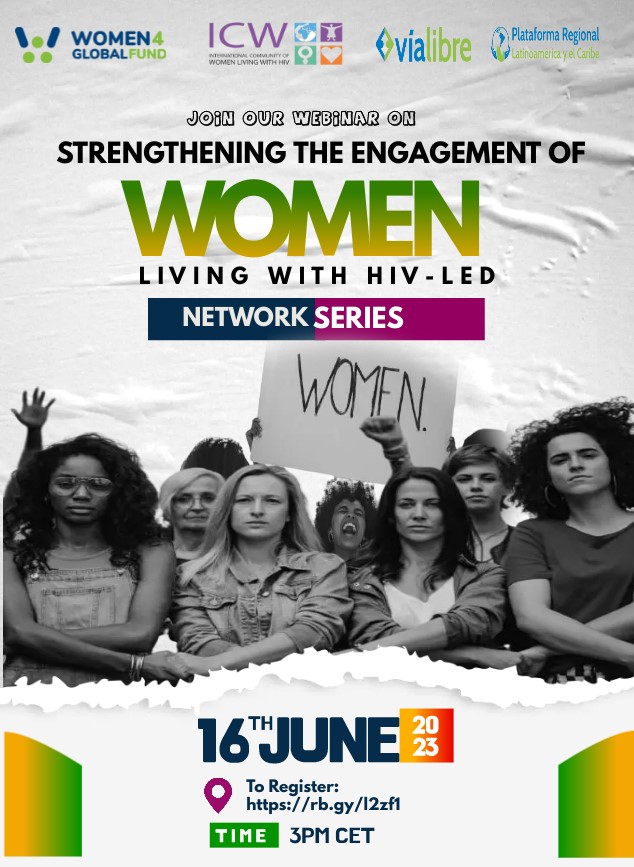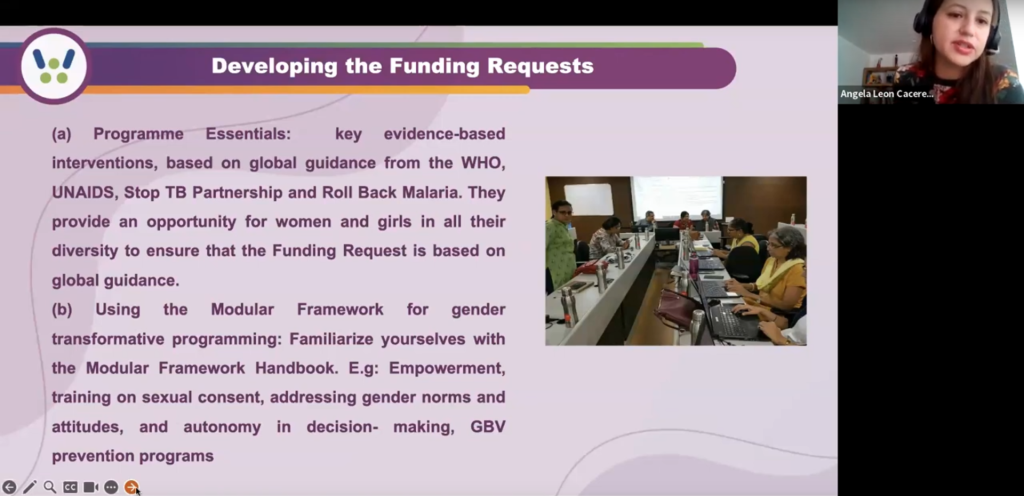
On June 16th, W4GF co-organised with ICW the webinar “Global Fund 101: reinforcing gender equality” for Women living with HIV and Key Populations, which purpose was to discuss how to ensure meaningful involvement of women in all of their diversity in the GC7 funding process and increase the inclusion of gender-sensitive and transformative actions in the requests.
Thea Willis, Equity advisor of the Community Rights and Gender Department at the Global Fund, reflected on the TRP report, emphasising the importance of gender equality in achieving the goals of the Global Fund. She presented the new gender-related initiatives and programs under GC7, including the inclusion of gender considerations, gender equality technical briefs, gender equality markers, and corporate key performance indicators. Also, the TRP window 1 debrief on gender was highlighted, which showed that a significant percentage of funding requests addressed gender barriers and maximised gender equality. Thea discussed the comprehensive gender assessment conducted by the TRP and the importance of meaningful participation of women and girls in the assessment process. The first panellist emphasised the need to tackle underlying causes of gender inequality to maximise gender equality in funding requests.
Sita Sahi, the Coordinator of ICW Asia Pacific, shared the background and purpose of the ICW Asia Pacific network, which aims to address health issues and support women living with HIV. She discussed the challenges women’s networks face in engaging in national Global Fund processes and the need for more information to be available to women.
Sita explained how the ICW Asia Pacific network conducted assessments in three countries to support women’s engagement in the country processes of the Global Fund. She highlighted the importance of including women’s recommendations in funding requests and using collected information for advocacy and resource mobilisation.
Sveta Moroz and Olena Stryzhak, shared the experiences from EECA Regions. Olena discussed the advocacy efforts to address SRHR, women’s rights, and violence against women living with HIV. Sveta presented the knowledge of the Eurasian Women’s Network on AIDS (EWNA) and their focus on access to SRHR, women’s leadership, and community development. She mentioned specific projects and interventions to promote human rights and eliminate violence against women, like the 2023 Regional project “Sustainability of services for key populations in the region of EECA”. They conducted a Women-led gender assessment to identify how countries address barriers to HIV services for women living with HIV, sex workers and women who use drugs (15 EECA countries). Additionally, she introduced the women-led monitoring system designed to address violence against women living with HIV. This system encompasses an examination of factors that hinder the seeking of support and assistance for women living with HIV who encounter violence in both Kazakhstan and Moldova.
Ángela León Cáceres, the Global Coordinator of W4GF, shared an overview of W4GF’s mission and key Recommendations for engagement and gender-transformative advocacy. Ángela provided an overview of the Women4GlobalFund (W4GF) movement and its objectives. She discussed the importance of removing gender barriers to respond comprehensively to the three diseases. Also, she highlighted key recommendations for engagement and advocacy, such as using the modular framework, considering gender equality markers and assessments, and working with the CCM on the community priority annexe.
Ángela shared the key strategies to improve the meaningful participation of women. These advocacy tools are: Advancing youth-responsive programming, particularly for adolescent girls and young women; conducting gender assessment to understand gender inequalities, discrimination and differentiated behaviours, needs and barriers about the three diseases; using the gender Equality Marker (GEM) to evaluate the extent to which funding request in the 2023-2025 allocation period address gender equality.

We are happy to share the slides used by our Global Coordinator in the Webinar in the following Link
Also, you can watch the video here Link
